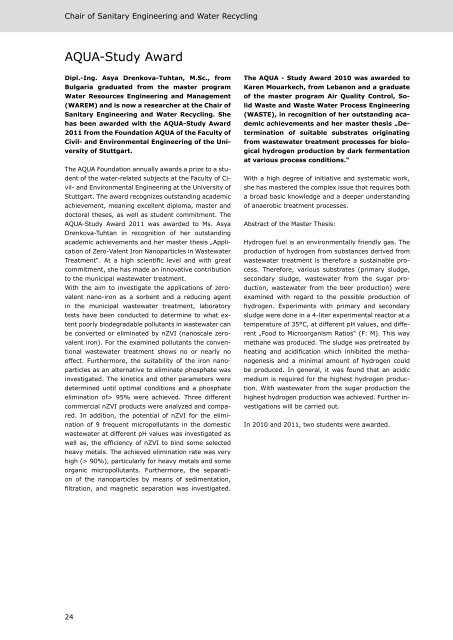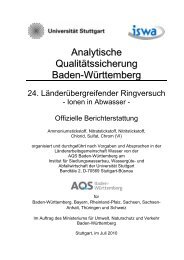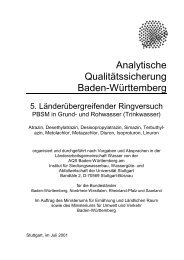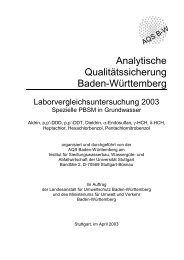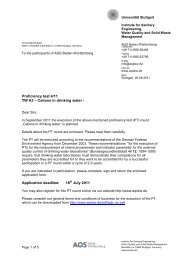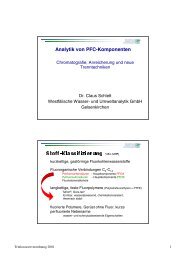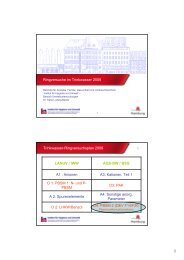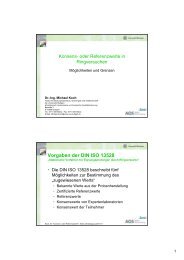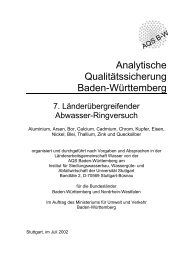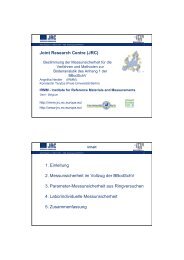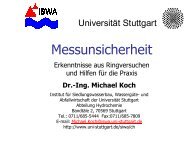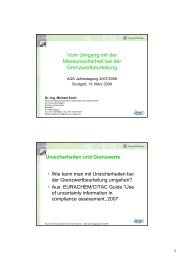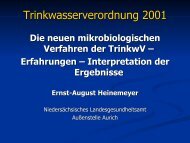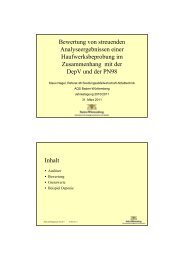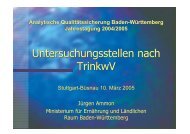Download - Institut für Siedlungswasserbau, Wassergüte- und ...
Download - Institut für Siedlungswasserbau, Wassergüte- und ...
Download - Institut für Siedlungswasserbau, Wassergüte- und ...
Create successful ePaper yourself
Turn your PDF publications into a flip-book with our unique Google optimized e-Paper software.
Chair of Sanitary Engineering and Water Recycling<br />
AQUA-Study Award<br />
Dipl.-Ing. Asya Drenkova-Tuhtan, M.Sc., from<br />
Bulgaria graduated from the master program<br />
Water Resources Engineering and Management<br />
(WAREM) and is now a researcher at the Chair of<br />
Sanitary Engineering and Water Recycling. She<br />
has been awarded with the AQUA-Study Award<br />
2011 from the Fo<strong>und</strong>ation AQUA of the Faculty of<br />
Civil- and Environmental Engineering of the University<br />
of Stuttgart.<br />
The AQUA Fo<strong>und</strong>ation annually awards a prize to a student<br />
of the water-related subjects at the Faculty of Civil-<br />
and Environmental Engineering at the University of<br />
Stuttgart. The award recognizes outstanding academic<br />
achievement, meaning excellent diploma, master and<br />
doctoral theses, as well as student commitment. The<br />
AQUA-Study Award 2011 was awarded to Ms. Asya<br />
Drenkova-Tuhtan in recognition of her outstanding<br />
academic achievements and her master thesis „Application<br />
of Zero-Valent Iron Nanoparticles in Wastewater<br />
Treatment“. At a high scientific level and with great<br />
commitment, she has made an innovative contribution<br />
to the municipal wastewater treatment.<br />
With the aim to investigate the applications of zerovalent<br />
nano-iron as a sorbent and a reducing agent<br />
in the municipal wastewater treatment, laboratory<br />
tests have been conducted to determine to what extent<br />
poorly biodegradable pollutants in wastewater can<br />
be converted or eliminated by nZVI (nanoscale zerovalent<br />
iron). For the examined pollutants the conventional<br />
wastewater treatment shows no or nearly no<br />
effect. Furthermore, the suitability of the iron nanoparticles<br />
as an alternative to eliminate phosphate was<br />
investigated. The kinetics and other parameters were<br />
determined until optimal conditions and a phosphate<br />
elimination of> 95% were achieved. Three different<br />
commercial nZVI products were analyzed and compared.<br />
In addition, the potential of nZVI for the elimination<br />
of 9 frequent micropollutants in the domestic<br />
wastewater at different pH values was investigated as<br />
well as, the efficiency of nZVI to bind some selected<br />
heavy metals. The achieved elimination rate was very<br />
high (> 90%), particularly for heavy metals and some<br />
organic micropollutants. Furthermore, the separation<br />
of the nanoparticles by means of sedimentation,<br />
filtration, and magnetic separation was investigated.<br />
The AQUA - Study Award 2010 was awarded to<br />
Karen Mouarkech, from Lebanon and a graduate<br />
of the master program Air Quality Control, Solid<br />
Waste and Waste Water Process Engineering<br />
(WASTE), in recognition of her outstanding academic<br />
achievements and her master thesis „Determination<br />
of suitable substrates originating<br />
from wastewater treatment processes for biological<br />
hydrogen production by dark fermentation<br />
at various process conditions.“<br />
With a high degree of initiative and systematic work,<br />
she has mastered the complex issue that requires both<br />
a broad basic knowledge and a deeper <strong>und</strong>erstanding<br />
of anaerobic treatment processes.<br />
Abstract of the Master Thesis:<br />
Hydrogen fuel is an environmentally friendly gas. The<br />
production of hydrogen from substances derived from<br />
wastewater treatment is therefore a sustainable process.<br />
Therefore, various substrates (primary sludge,<br />
secondary sludge, wastewater from the sugar production,<br />
wastewater from the beer production) were<br />
examined with regard to the possible production of<br />
hydrogen. Experiments with primary and secondary<br />
sludge were done in a 4-liter experimental reactor at a<br />
temperature of 35°C, at different pH values, and different<br />
„Food to Microorganism Ratios“ (F: M). This way<br />
methane was produced. The sludge was pretreated by<br />
heating and acidification which inhibited the methanogenesis<br />
and a minimal amount of hydrogen could<br />
be produced. In general, it was fo<strong>und</strong> that an acidic<br />
medium is required for the highest hydrogen production.<br />
With wastewater from the sugar production the<br />
highest hydrogen production was achieved. Further investigations<br />
will be carried out.<br />
In 2010 and 2011, two students were awarded.<br />
24


